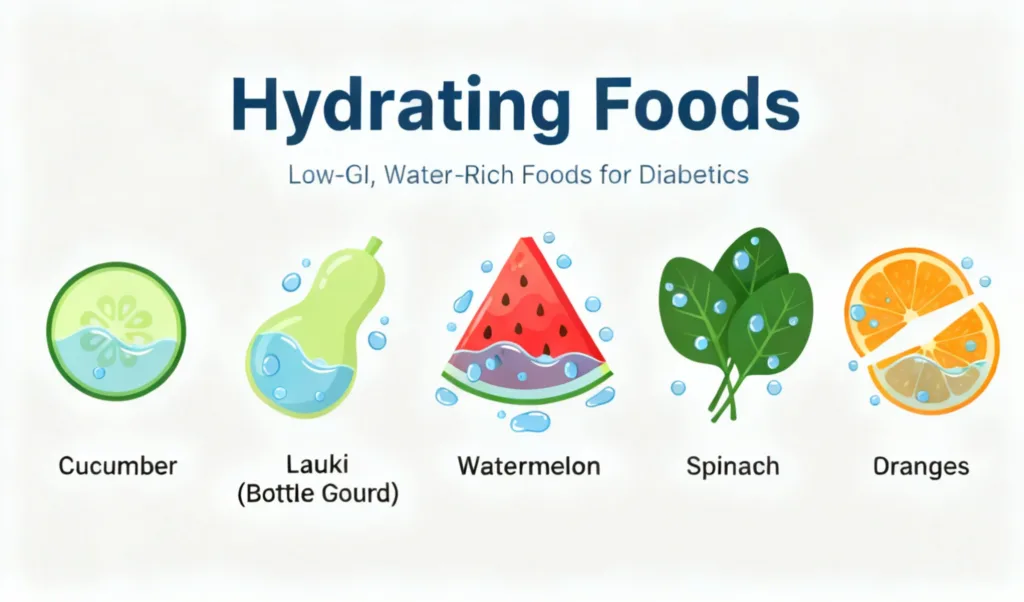The Importance of Hydration in Overall Health
When we think about good health, we often think of nutritious diets for diabetes reversal, exercise routines, or medical check-ups. But one factor that quietly supports every bodily function is hydration. The importance of hydration lies in its ability to regulate internal systems that we often take for granted—circulation, digestion, metabolism, and temperature control.
Why the Body Needs Water
Our body is about two-thirds water. Every single cell, tissue, and organ relies on it. Water helps carry oxygen to muscles, flush toxins from the kidneys, and regulate body temperature. For people with diabetes, water plays an additional role—it helps remove excess glucose through urine and prevents dangerous spikes. Without adequate water, these processes slow down, and the risk of complications rises.
Connection Between Hydration and Energy Levels
Many patients report feeling tired even when they eat well. One reason could be dehydration. Water aids in breaking down nutrients and delivering them to cells for energy. When fluid levels drop, the body diverts energy to survival functions, leaving you sluggish. Patients who begin monitoring their hydration often notice more consistent energy throughout the day.
Benefits of Hydration for Blood Sugar and Blood Pressure
How Hydration Supports Healthy Blood Pressure
One of the simplest ways to stabilize blood pressure is to stay hydrated. Adequate fluid keeps blood thinner and vessels more elastic. This reduces vascular resistance and lowers the pressure against artery walls. For diabetics, hydration also dilutes glucose concentration, reducing the load on insulin. Learn more about our hypertension reversal program.
The Impact of Dehydration on Blood Pressure Levels
Short-Term Effects of Dehydration on Blood Pressure
In the short term, dehydration causes dizziness, headaches, or low pressure when standing suddenly. For some patients, the opposite occurs—the body activates stress hormones that constrict vessels, causing a sudden rise in blood pressure. Both extremes can be risky for people already battling high blood pressure.
Long-Term Risks of Chronic Dehydration
Chronic dehydration thickens blood, damages vessel walls, and accelerates plaque buildup. Over time, this increases the risk of stroke and kidney failure.
Dehydration and Risk of Heart Strain
Think of the heart as a pump. When the body is well-hydrated, the pump works smoothly. When fluids drop, the pump is forced to push thicker blood, straining the heart muscle. For a diabetic or obese patient, this additional burden can become life-threatening if ignored.
Hydration Tips for Healthy Blood Pressure Management
Daily Water Intake Recommendations
Most adults require 2.5–3.5 liters per day, though this may increase in hot climates or with physical activity. For people with unstable sugar levels, water helps reduce glucose buildup in the bloodstream and supports kidney filtration.
Lifestyle Habits That Improve Hydration
- Start the day with water before coffee or tea.
- Sip water in small amounts regularly instead of gulping large amounts infrequently.
- Replace one sugary drink daily with fresh water or hydrating dietary alternatives.
Simple Reminders to Stay Hydrated During the Day
- Set alarms every 2–3 hours.
- Use bottles marked with hourly intake goals.
- Pair water intake with routine activities—like after bathroom breaks or before meals.
Hydrating Foods for Blood Sugar Control

Fruits with High Water Content
- Strawberries (91% water): Rich in vitamin C and antioxidants.
- Guava (80% water): High fiber, supports gut health.
Vegetables That Promote Hydration
- Cucumber (96% water): Cooling, fiber-rich, and ideal for salads.
- Bottle gourd (92% water): Traditionally used in soups for diabetics.
- Cabbage (92% water): Adds volume without raising glucose.
- Zucchini (95% water): Low-carb and versatile.
Best Snacks to Balance Blood Sugar and Hydration
- Broccoli soup in white makkhan.
- Cucumber sticks with Greek yogurt dip.
- Chia seed water with strawberries.
The Role of Water in Glucose Regulation
One of the most underrated tools in diabetes care is plain water. Research shows that individuals who drink more water have lower fasting glucose levels. This demonstrates the value of managing blood sugar naturally.
Water vs. Sugary Drinks – Healthier Choices
Sugary sodas, packaged juices, and energy drinks cause rapid spikes in blood sugar. Water dilutes glucose naturally, prevents spikes, and supports insulin function—all without calories. Patients undergoing anti-cancer diet support also benefit from replacing sugary drinks with water.
Role of Hydration in Cardiovascular Health
Hydration and Heart Function
Adequate hydration ensures smoother pumping of blood, maintaining rhythm and reducing clot risk. For hypertensive patients, this lowers the chances of sudden pressure surges that can lead to strokes.
How Proper Fluid Balance Improves Circulation
When properly hydrated, blood moves easily through vessels, reducing friction and maintaining oxygen supply to tissues. This supports kidney function, improves endurance, and prevents heart failure. Staying hydrated is also linked with lifespan extension therapies.
Preventing Cardiovascular Stress with Regular Hydration
By drinking enough water, patients can prevent cardiovascular stress, reduce arterial stiffness, and lower long-term complications. The role of hydration in cardiovascular health should be treated as a cornerstone of preventive medicine.
Why Choose Redial Clinic for Managing Blood Sugar and Blood Pressure?
At Redial Clinic, Green Park, Delhi, we go beyond prescribing diets—we educate patients about lifestyle factors that make or break long-term health. Our clinical nutritionists emphasize hydration, guide patients with hydration tips for healthy blood pressure, and include hydrating foods for blood sugar control in customized diet plans. By combining personalized monitoring with holistic guidance, we help patients achieve real reversal, not just symptom control.
Case Study: Hydration in Action
A 52-year-old patient with type 2 diabetes and high blood pressure visited Redial Clinic. Despite following a low-carb diet, her sugar levels fluctuated, and BP remained unstable. Upon assessment, we found she drank less than 1 liter of water daily, often substituting it with tea.
We introduced simple changes:
- Increasing water intake to 3 liters per day.
- Adding cucumber and lauki soup twice a week.
- Replacing one cup of tea with coconut water.
Within 3 months, her fasting glucose dropped by 25 mg/dL, blood pressure stabilized, and her energy levels improved significantly. This case highlights how hydration, though simple, can have transformative effects.
Conclusion
The importance of hydration goes far beyond quenching thirst. It supports metabolism, stabilizes blood sugar, lowers blood pressure, and protects cardiovascular health. For diabetics and hypertensive patients, small changes—like drinking more water, eating hydrating foods for PCOS support, and avoiding sugary drinks—can prevent complications and improve quality of life.
Final Verdict
The importance of hydration in chronic disease management cannot be underestimated. Water is not just a neutral beverage—it is medicine for your body. From balancing glucose levels to easing cardiovascular strain and lowering hypertension risk, the benefits of hydration are both immediate and long-term.
Patients with diabetes and high blood pressure often search for complicated diets and supplements, yet something as simple as water can make a significant difference. By focusing on hydration tips for healthy blood pressure, including hydrating foods for blood sugar control, and understanding the role of hydration in cardiovascular health, you can take charge of your health naturally.
At Redial Clinic, Green Park, Delhi, we integrate hydration strategies into personalized nutrition and lifestyle plans. With clinical expertise, patient tracking, and holistic care, we ensure that something as basic as water becomes your most powerful tool in managing blood sugar and protecting your heart.
If you or your loved one is struggling with unstable blood sugar or blood pressure, book your consultation today. Sometimes, the first step toward reversal is as simple as a glass of water.






